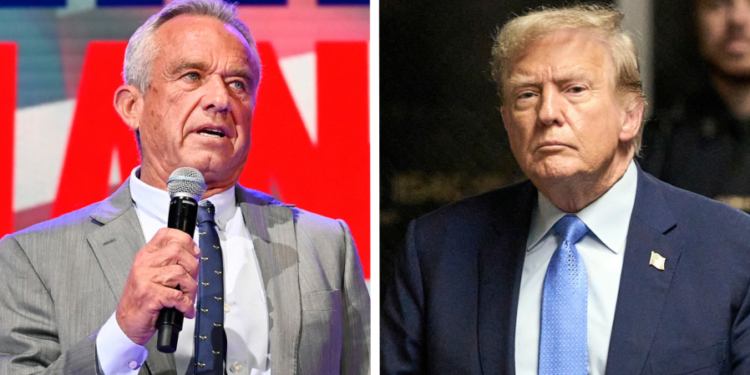
President-elect Trump suggested in an interview Sunday that Robert F. Kennedy Jr, his pick to lead the Department of Health and Human Services, would investigate a debunked link between vaccines and autism.
“When you look at some of the problems, when you look at what’s going on with disease and sickness in our country, something’s wrong,” Trump said on “Meet The Press.” Asked by moderator Kristen Welker if he was referring to autism, Trump said autism rates have risen dramatically.
“I think somebody has to find out. If you go back 25 years ago, you had very little autism. Now you have it,” he said.
“Autism was almost non-existent. It was, you know, one out of 100,000. And now it’s close to one out of 100 … that’s a pretty bad number,” Trump said, adding he was “open to anything” when asked if Kennedy would look into it.
“I mean, something is going on. I don’t know if it’s vaccines. Maybe it’s chlorine in the water, right? You know, people are looking at a lot of different things,” he said.
Kennedy has spent decades religiously promoting the theory that childhood vaccines have led to an increase in autism and chronic illnesses, despite studies repeatedly showing otherwise.
Autism diagnoses have been rising, though Trump misstated the extent of the increase. About one in 36 children now have a diagnosis of autism spectrum disorder (ASD), according to estimates from the Centers for Disease Control and Prevention, compared to about one in 150 in 2000. But experts have attributed the increase to better awareness of symptoms in children and changing criteria to diagnose ASD in kids.
Kennedy has argued he is not anti-vaccine but thinks that childhood shots aren’t safe and that the government hasn’t done enough studies to prove otherwise.
According to the CDC, standard childhood vaccines prevented 1.3 million premature deaths and 32 million hospitalizations between 1994 and 2023.
The debunked theory connecting autism and childhood vaccines first garnered major attention in 1998, when a paper published in a British medical journal purported to find a link between the measles, mumps and rubella vaccine and autism.
The study, which was based on only 12 children, was eventually retracted. A panel concluded author Andrew Wakefield violated basic research ethics rules and subjected the children in his study to needless invasive tests for which he did not have approval. Wakefield was then banned from practicing medicine in Britain.
Trump’s comments suggest support for Kennedy’s viewpoint, though he was careful to note he supports the benefits of certain vaccines.
When Welker asked if he “wanted see childhood vaccines eliminated,” Trump responded: “If they’re dangerous for the children.”
“I’m not against vaccines. The polio vaccine is the greatest thing,” Trump said. “If somebody told me to get rid of the polio vaccine, they’re going to have to work real hard to convince me. I think vaccines are — certain vaccines — are incredible. But maybe some aren’t. And if they aren’t, we have to find out.”






